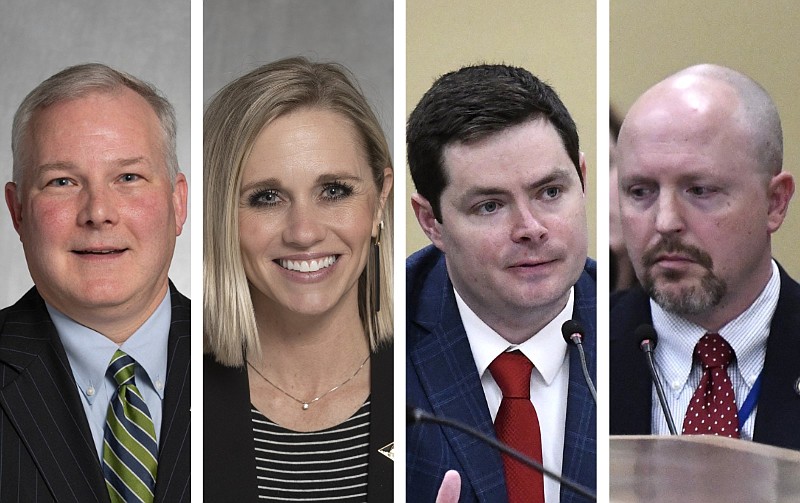Arkansas Attorney General Tim Griffin on Wednesday announced the creation of a bipartisan working group intended to review and suggest modernizations to the Arkansas Freedom of Information Act.
Griffin touted the Arkansas Freedom of Information Act (FOIA) Review Working Group as a “badly needed” coalition consisting of lawmakers and members of the legal and press communities that will provide him with recommendations on how to update and improve Arkansas’ open records law.
“The last time FOIA was modernized, the iPhone hadn’t been invented yet,” Griffin said in a new release. “Since then, the use of digital records and new communications technology has increased exponentially, making it possible for public entities to create and retain more records than ever before, making responding to FOIA requests more complex and increasing the amount of FOIA requests being lodged with public entities.”
Jeff LeMaster, a spokesperson for Griffin, described the seven-member coalition as an “informal, conversational group” in a written statement. The group’s meetings will not be open to the public, LeMaster said.
Griffin has appointed the following people to the working group, according to the news release:
• State Sen. Breanne Davis, R-Russellville
• Ryan Owsley, deputy attorney general, opinions division
• John Payne, deputy attorney general, civil litigation division
• State Rep. David Ray, R-Maumelle
• State Sen. Clarke Tucker, D-Little Rock
• John Tull III, partner at Quattlebaum, Grooms & Tull, PLLC
• Ashley Kemp Wimberley, executive director, Arkansas Press Association
The working group met for the first time Tuesday and will meet roughly once a month starting in September. In late spring or early summer of 2024, the coalition will give the attorney general its recommendations for him to consider adding to his legislative package for the 2025 regular session, LeMaster said.
Some government transparency advocates voiced support for updating the state’s Freedom of Information Act but said they wished the working group’s meetings were held in public and raised concerns about changes to the act that could make it more difficult for the public to access information.
Joey McCutchen, a Fort Smith lawyer who has handled several Freedom of Information cases, said he welcomes attempts to modernize the Freedom of Information Act but said “I don’t want that to be the code for weakening FOIA.”
Rob Moritz, chairman of the Arkansas Freedom of Information Act Task Force, said he looked forward to seeing recommendations from the group. He noted, however, that during this year’s regular legislative session Ray and Davis sponsored a bill that would have exempted certain records from public scrutiny.
“I’m just saying this is just some concerns,” Moritz said.
House Bill 1726, which failed to advance from committee, would have shielded documents including law enforcement records related to ongoing investigations from the act. It also would have triggered a requirement to pay for an employee or a contractor to fulfill the request at the rate of pay of the lowest-paid employee or contractor with the necessary skill to process the request.
Ray defended his bill during the session, saying it “aims to preserve strong government transparency while addressing the problems caused by people who weaponize FOIA and use it as a tool of harassment to simply throw sand in the gears of state government.”
When reached Wednesday night, Ray pointed to a statement he made in Griffin’s news release.
“It is important that our laws provide citizens with ample transparency wherever possible and give taxpayers the efficient, customer-focused government they deserve. I look forward to serving on this working group,” Ray said in the release.
Davis in a written statement said she was “excited about the work ahead on FOIA” and thanked Griffin for including her in the group.
“I am passionate about FOIA and ensuring our laws today are delineated and relevant in a way that clearly applies to the twenty first century, protecting the transparency of government while also protecting against FOIA abuse,” she said.
Griffin said in a written statement that concerns about the group leading to a weakening of the Freedom of Information Act were “baseless and disrespectful to the members of the working group.
“It is time that calm voices who approach FOIA from very different perspectives work together to find that common ground. That’s why I formed this working group,” he said.
Robert Steinbuch, a member of the FOIA Task Force and a law professor at the University of Arkansas at Little Rock, disagreed with Griffin’s assessment that the Freedom of Information Act has not been recently updated, pointing to a records act passed the during this year’s regular legislative session.
Griffin said in a statement Wednesday night, “The FOIA was last reviewed to bring it into the electronic age in 2001.”
Eliza Gaines, publisher of WEHCO Media Inc., parent company of The Arkansas Democrat-Gazette, said Arkansas’ Freedom of Information Act “is one of the strongest in the nation, and taxpayers have a right to access records that are available as public information.
"Advances in technology should yield greater access to public records, not less. We hope that AG Griffin’s task force strikes the correct balance in its consideration of new ideas to improve our FOIA,” she said.
Tucker, an attorney, said in the news release “Arkansas has one of the strongest FOI laws in the country, and that’s the way it should stay.”
Tucker said that he looked forward to working with the group “to ensure that we have a strong FOIA fit for a modern world.”
